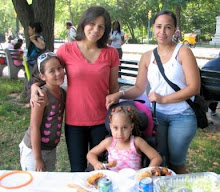The NY City Council Autism Initiative at SINERGIA is holding a workshop entitled “Helping Mothers to Promote Their Child’s Communication Through Play,” on Tuesday Nov. 17, 2009 from 10am to 12noon.
This Parent-Child Center workshop seeks to inform parents of the possibility of transforming playtime into an opportunity to support children with language delays, at risk of developing autism, and/or children already diagnosed with pdd/autism, to develop their communication and social abilities.
►Does your child take an interest in other children?
►Does your child ever use his/her index finger to point, to indicate interest in something?
►Does your child ever bring objects over to you (parent) to show you something?
►Does your child ever imitate you (e.g. you make a face and your child imitates it?)
►Does your child respond to his/her name when you call?
►If you point at a toy across the room, does your child look at it?
If you answered "no" to several of these questions, you will benefit from the information provided in our workshop.
Date & Time: Tuesday, November 17, 2009 from 10AM – 12Noon
Place: Sinergia, 134 West 29 St., 4th Floor, between 6th and 7th Avenues
Transportation: Subways # 1, N, Q, R, to 28th or 34th Streets
Contact: Call Gina Peña-Campodónico to confirm your attendance at 212-643-2840 x 305
Made possible with funds from The New York City Council.
Note: If you are interested, you may be eligible to participate in a in free Hunter College’s Communication and Play Lab Early Intervention study for parents with 16- to 30-month old children, using playtime to encourage a child's development. It will identify strengths and weaknesses in the the way a child communicates, and determine which techniques work best for the child.
Update:
The workshop was very successful as evidenced by the large turnout of parents who eagerly participated and had many questions and comments to share. It was conducted by Michael Siller, Ph.D. an assistant professor of psychology at Hunter College (City University of New York). Dr. Siller studies the development of social and communication skills in young children. He is particularly interested in how parent-child play interactions contribute to the social, emotional, and communication development of young children with autism spectrum disorders. He directs the Communication and Play Lab at Hunter College. For pictures visit our
Facebook page.
 Date: Wednesday, December 9, 2009
Date: Wednesday, December 9, 2009










